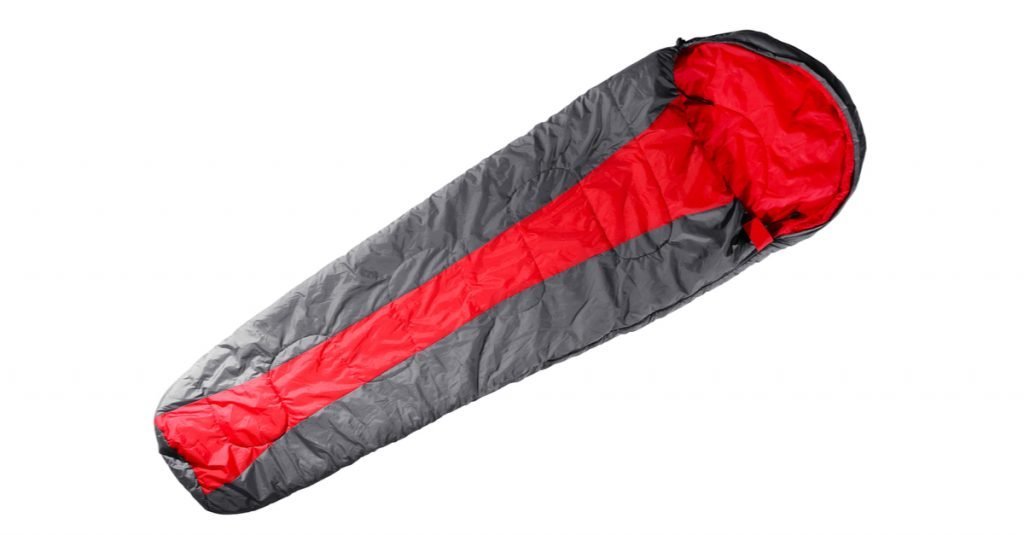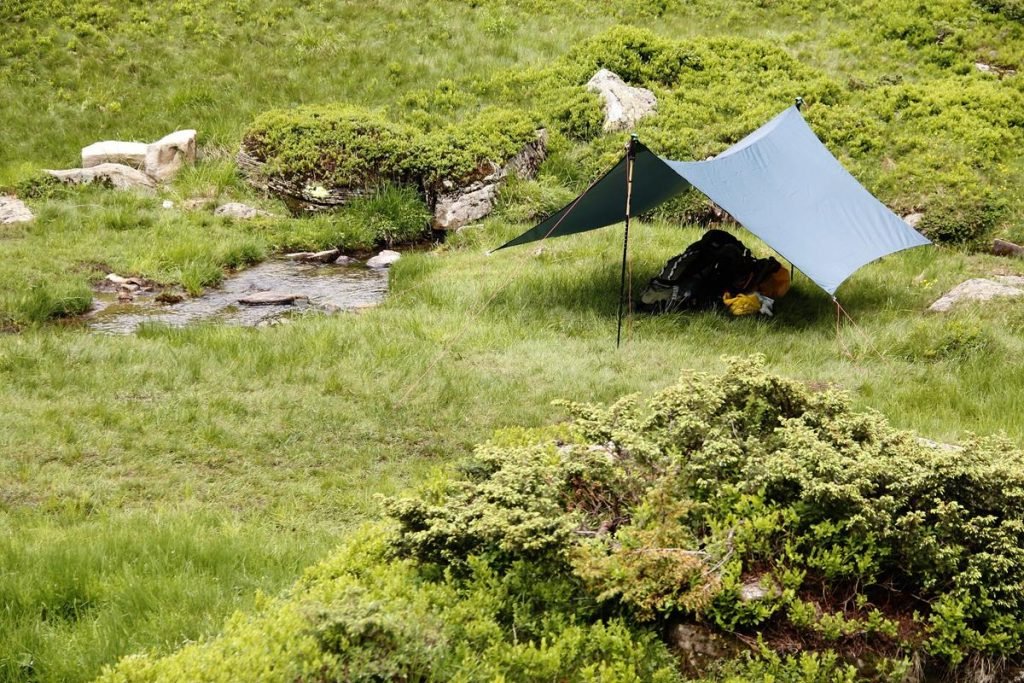A blanket can be a very good alternative to a sleeping bag when camping. A blanket, with sheets, can be particularly good when family camping when you are sleeping on an air mattress. In the right environment, a blanket is quicker, easier and more convenient than a sleeping bag.
In fact, there are several great alternatives to using sleeping bags when camping:
- Blanket and pillow – Works really well with a sleeping pad on those warm summer nights. Not so good when it’s cold and you need the maximum possible warmth
- Camping quilt – mostly for backpackers and ultralight hikers. A camping quilt can also be an option as your children get older and want to assert a degree of independence in their camping sleeping arrangements
- Hammocks – mostly for backpackers and ultralight hikers again. Can be a fun option to add to your family camping packing checklist if you want to try a few nights camping under the stars
- Duvet, sheets and pillows – this is our choice for comfortable family camping
All About Sleeping Bags
The Case For Sleeping Bags
Sleeping bags remain a great, quick and easy option for camping. For many of us, those who have grown up camping, a sleeping bag is synonymous with sleeping while camping. For this reason, many campers (including family camping), stick rigidly to using sleeping bags.


That is fine.
Sleeping bags have a number of advantages:
- All in one solution – climb into your sleeping bag and you have all the bedding you need to get to sleep. Well sort of. We would never recommend sleeping directly on the ground no matter how good your sleeping bag.
- Lightweight and compact
- Available in several types and styles to meet requirements of different styles of camping
- Available with a large range of insulation levels (check the R or tog ratings. Better still, check out ISO or EN ratings for sleeping bag insulation)
- Available to meet a wide range of price points depending on features required
- When you are in your sleeping bag and fully zipped up, you have a lot of protection from the local flies and midges
What Are Sleeping Bags Designed To Do
As the TrailSherpa notes, ‘Sleeping Bag Design is at once simple, and yet very complicated’. The simple bit is that a sleeping bag is designed to keep us warm when we are sleeping. The complex bit comes from the range of materials that improve the heat retention at the lowest possible bulk and weight.
One thing to note, sleeping bags are not designed to make it comfortable to lie on the ground. In fact, when you lie on a modern, lightweight sleeping bag, there is practically no cushioning effect. the weight of your body crushes the sleeping bag and forces the air out of the bag.
Most sleeping bags are designed for use with a sleeping pad to provide a little cushioning and to provide insulation between you and the ground. Rei.com talks of your ‘sleeping system’. A sleeping system for camping consists of your sleeping bag, sleep pad, and the clothes you wear when sleeping. We would add in a pillow though pillows can be improvised.
The desire to make sleeping bags both thermally efficient, and to keep them as light as possible, also affects the types of bags available. For those who need the maximum warmth at the minimum possible weight, mummy style sleeping bags are a good option. Where warmth and thermal insulation is not the absolute priority, rectangular sleeping bags are a good, usually cheaper, option.
Lightweight Mummy Sleeping Bag
Of course, it is perfectly possible to use sleeping bags in family camping setups. Air mattresses are comfortable and provide plenty of thermal insulation between you and the ground.
The Case Against Sleeping Bags
Comfort
The case against sleeping bags stems from what they are designed to do – maximum thermal insulation at minimum bulk and weight. That always translates into the minimum possible material.
Mummy sleeping bags in particular can seem like straight jackets. Once in and zipped up, you are totally confined. The amount of movement of your arms and legs is limited. If you need to roll over, you and the whole sleeping bag need to roll together.
For those that sleep on their backs, sleeping bags don’t seem to be so much of a problem. For those of us that sleep on our sides, turning over fairly regularly is essential if we are not to end up with sore and bruised hip bones. I have lost track of how many times I have been woken by falling off my sleeping pad.
They Aren’t Necessary
The vast majority of family camping trips in the US take place in late spring, summer, and early fall. The biggest problem for most of us is not keeping warm – it is in keeping cool. Sleeping bags do a good job of keeping you warm. It can be so much more difficult to get cool.
For those of us who now only camp using our cars as the pack horse, we have no need for the minimalist design of sleeping bags. It is easy to add a couple of blankets or duvets to your car so you can make your camping sleeping system match your needs.
The Alternatives to Sleeping Bags While Camping
Blanket and Pillow
We suspect the original question may stem from some of the great western movies of the past. At the end of the day we see a grizzly cowpoke lay out his bedroll next to the campfire. With just a blanket for cover, he lies down to sleep.
If you take a look at the video below, you will see that there was nothing simple about a cowboy’s bedroll
It is still perfectly possible to camp just like this. For some ultralight enthusiasts, it is the preferred way to camp. For bedroll read sleeping pad. For blanket read, well…, blanket.
There are many camping blankets designed and sold for exactly this purpose.
Add in a lightweight tarp as a top cover and you have the perfect, lightweight, bivouac setup.

Blankets work just as well for family camping trips. Instead of creating a minimalist bivvy, you are probably going to be sleeping in a nice, big family camping tent. In our case, we will be sleeping on a nice air mattress (we have never had problems with air mattresses leaking and deflating). The use of a camping blanket is a great, comfortable way to sleep.
We always mention pillows. It is possible to improvise pillows but why bother. Either take a camping pillow or, better, just take your pillows from home.
Camping Quilt
If you have been researching sleeping under a blanket, you have probably come across camping quilts. These are not like the quilt sets you would buy for your home. However, just as with a camping blanket, there is no reason why you couldn’t take a quilt or bed spread on your family camping trip.
A camping quilt is different. As with many things to do with camping, its origins are in the backpacking and ultralight arenas. Camping quilts are a bit like sleeping bags with the bag cut out. This makes them a few ounces lighter than an equivalent sleeping bag.
Camping Quilts are often designed to attach to a sleeping pad
Camping quilts are usually designed to work with sleeping pads. They will often clip directly onto a sleeping pad. In this way, the sleeping pad provides the insulation and cushioning for your back, while the quilt keeps you warm.
Many ultralight enthusiasts have become fans of camping quilts. They do not confine and constrict in the same way as a mummy sleeping bag. In less harsh environments, they delivery all the warmth and comfort you need.
Camping quilts can have a role to play in family camping. Our experience is that growing children want to have their own sleeping space. For many, a sleeping pad and mummy sleeping bag is a great starting point. A sleeping pad and camping quilt is a viable alternative.
Hammocks
Camping hammocks have become quite sophisticated and can provide a self-contained camping sleeping system.
Camping Hammocks can be quite sophisticated with tree straps, mosquito nets and more
Yet again, camping hammocks are often used by backpackers and ultralight hikers. The attraction is obvious – find 2 trees, string your hammock, and you are ready to sleep. They are not so good in very cold weather, or when it is windy or wet. Many users will also carry a lightweight tarp to provide shelter from the rain, but this does increase the speed and complexity of deploying the hammock
Hammocks are an acquired taste. Some people love them. For us, we find them to be as restrictive and confining as a mummy sleeping bag.
We do usually have a hammock with us. Our elder boy loves camping outside. If we are camping in wooded areas, we can quickly pitch the hammock near to our family tent. It started as a bit of a novelty. It was startling how quickly he ended up sleeping in the family tent the first few times.
Duvets, Sheets and Pillows
If you have read any of our posts on comfortable family camping, you know we strongly favor using a duvet, sheets and pillows on our camping trips. It’s what we use at home.
When we pack the car, just about the last job is for everyone to grab their duvet and pillows. It is a bit bulky but, because it is so soft, you can pack duvets around the rest of your gear or even around passengers in the car.
We are all about the comfortable side of tent camping. We use a large, 10-person tent that has 3 separate living/bedroom areas. For Jo and I, we always use a queen sized air mattress. We find using a duvet to be comfortable and flexible. The air mattress provides more that sufficient insulation from the ground. With a duvet, we can pull it up to be snug and warm, or push it down for better cooling and ventilation.
The sleeping arrangement for the boys has constantly changed. We started with them using sleeping bags and single air mattresses. This is not a great idea. The sleeping bag and mattress were too slippery. As soon as one or other turned over, the mattress would go flying off.
For the most part, they still sleep in sleeping bags but changed to use sleeping pads. This is OK but not perfect.
As we have described, we have been few several iterations with their sleeping arrangements as their need for independence has grown.
Summary
A blanket is a good alternative to sleeping bags for the right circumstances. You can use a camping blanket in an ultralight bivouac. You can also use a camping blanket in your family tent.
Sleeping bags are great where warmth, packed size and weight are primary concerns. There is no serious challenge to sleeping bags for most backpackers, ultralight hikers, or anyone looking to camp in extreme weather conditions.
A blanket is not the only viable alternative to a sleeping bag for sleeping while camping. You can easily use quilts and/or duvets for family camping.
Camping quilts are becoming popular for the more extreme, backpacking community.




